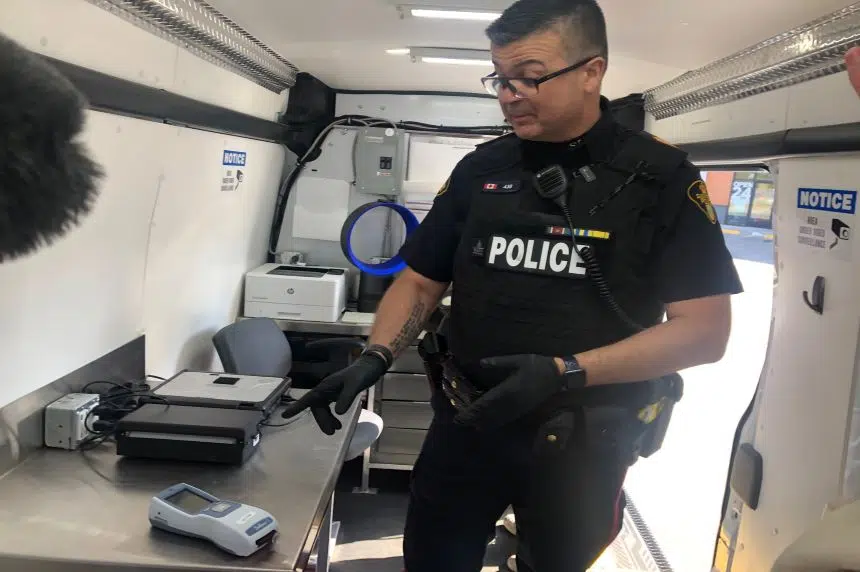So, you’ve smoked some weed … or maybe had some cannabis edibles.
SGI and the Saskatoon Police Service say there could be some serious consequences for you if you’re caught driving while high. On Monday, in front of Saskatoon’s Farmer Jane Cannabis Company, employees Kamryn Weisgerber and Anya Kinzel-Cadrin were both the subjects of THC roadside tests.
Weisgerber said she’d consumed cannabis earlier that morning, while Kinzel-Cadrin did so the night before. Both tested positive for THC.
“(It was) a little awkward, honestly,” they both said of the cheek swabs they had to use in order to take the test.
Kinzel-Cadrin said she was somewhat surprised she’d tested positive for THC.
“I’m a chronic, daily user so I wasn’t terribly surprised there would be a trace level in my system,” she said. “I feel sober, so that’s probably one of the reasons I was a little bit like, ‘Oh, that’s interesting.’ I feel fairly ‘with it,’ like I hadn’t consumed much.”
Staff Sgt. Patrick Barbar said there are currently two federally approved tests for detecting THC. They only reveal whether the drug is in a user’s system, not how much of it is there.
During a checkstop, he said police can test anywhere from two to 12 people and it takes about 10 minutes to do so. He’s often asked how a person can decide whether they should drive after consuming cannabis.
“Twelve to 24 hours in most people will clear it out of your oral fluid. The oral fluid is the bodily fluid that holds THC the least amount of time,” he said.
“A police officer needs to have reasonable suspicion — so, evidence in front of them — that there has been recent consumption of cannabis. So I mean, this is not rocket science. This is established through observation (and) smells — the same way it is with alcohol.”
If a test comes up positive and there has been a collision, or heavy use is suspected, further testing can be ordered, where a more precise result on how much THC is in someone’s system can be determined.
SGI’s Tyler McMurchy said the corporation has seen drug-related roadside suspensions skyrocket over the last couple of years.
“In 2019 there were 76 for the entire year related to drug use. Not all of those are cannabis, of course, and our numbers aren’t substance-specific. But in two years, that number has increased to more than 500. So we are seeing more people losing their licences temporarily for drug use,” he explained.
Depending on the level of impairment and whether the driver is involved in a collision where there are injuries or death, there can also be criminal charges, fines and jail time.
At a minimum, though, if you’re caught with THC in your system, McMurchy said there are a host of immediate consequences, including a three-day licence suspension and vehicle impoundment, a weekend impaired driving course for a first offence, and four points on your licence.
“There’s zero tolerance when it comes to drug-impaired driving in this province,” he said.













